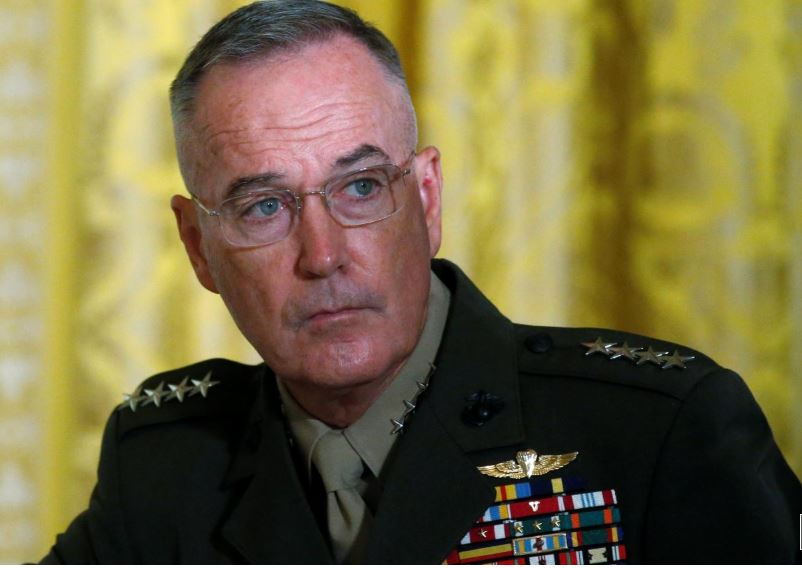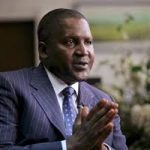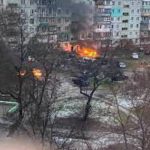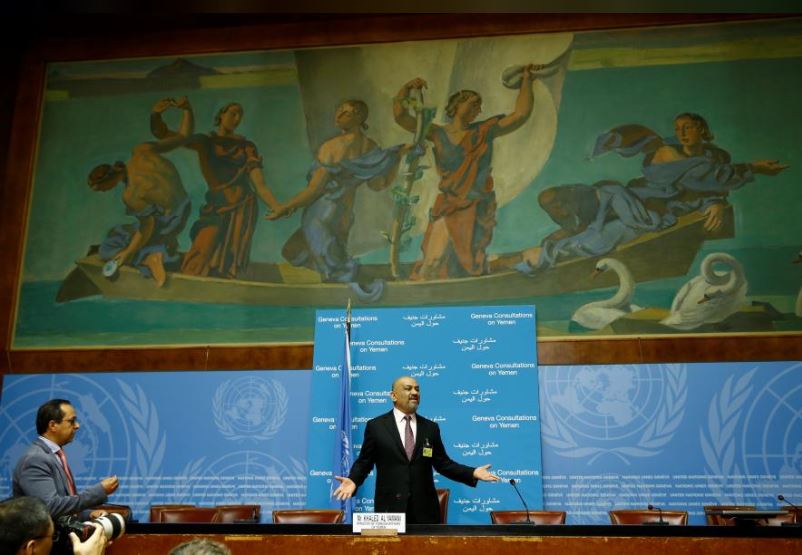America’s top general on Saturday said he was involved in “routine dialogue” with the White House about military options should Syria ignore U.S. warnings against using chemical weapons in an expected assault on the enclave of Idlib.
Marine General Joseph Dunford, chairman of the Joint Chiefs of Staff, said no decision had been made by the United States to employ military force in response to a future chemical attack in Syria.
“But we are in a dialogue, a routine dialogue, with the president to make sure he knows where we are with regard to planning in the event that chemical weapons are used,” he told a small group of reporters during a trip to India. Dunford later added: “He expects us to have military options and we have provided updates to him on the development of those military options.”
Syrian President Bashar al-Assad has massed his army and allied forces on the front lines in the northwest, and Russian planes have joined his bombardment of rebels there, in a prelude to a widely expected assault despite objections from Turkey.
This week, a top U.S. envoy said there was “lots of evidence” that chemical weapons were being prepared by Syrian government forces in Idlib.
The White House has warned that the United States and its allies would respond “swiftly and vigorously” if government forces used chemical weapons in Idlib. President Donald Trump has twice bombed Syria over its alleged use of chemical weapons, in April 2017 and April 2018.
Dunford did not say, one way or the other, what he expected Trump to do should Syria use chemical weapons again.
America’s top general on Saturday said he was involved in “routine dialogue” with the White House about military options should Syria ignore U.S. warnings against using chemical weapons in an expected assault on the enclave of Idlib.
Marine General Joseph Dunford, chairman of the Joint Chiefs of Staff, said no decision had been made by the United States to employ military force in response to a future chemical attack in Syria.
“But we are in a dialogue, a routine dialogue, with the president to make sure he knows where we are with regard to planning in the event that chemical weapons are used,” he told a small group of reporters during a trip to India. Dunford later added: “He expects us to have military options and we have provided updates to him on the development of those military options.”
Syrian President Bashar al-Assad has massed his army and allied forces on the front lines in the northwest, and Russian planes have joined his bombardment of rebels there, in a prelude to a widely expected assault despite objections from Turkey.
This week, a top U.S. envoy said there was “lots of evidence” that chemical weapons were being prepared by Syrian government forces in Idlib.
The White House has warned that the United States and its allies would respond “swiftly and vigorously” if government forces used chemical weapons in Idlib. President Donald Trump has twice bombed Syria over its alleged use of chemical weapons, in April 2017 and April 2018.
Dunford did not say, one way or the other, what he expected Trump to do should Syria use chemical weapons again.
America’s top general on Saturday said he was involved in “routine dialogue” with the White House about military options should Syria ignore U.S. warnings against using chemical weapons in an expected assault on the enclave of Idlib.
Marine General Joseph Dunford, chairman of the Joint Chiefs of Staff, said no decision had been made by the United States to employ military force in response to a future chemical attack in Syria.
“But we are in a dialogue, a routine dialogue, with the president to make sure he knows where we are with regard to planning in the event that chemical weapons are used,” he told a small group of reporters during a trip to India. Dunford later added: “He expects us to have military options and we have provided updates to him on the development of those military options.”
Syrian President Bashar al-Assad has massed his army and allied forces on the front lines in the northwest, and Russian planes have joined his bombardment of rebels there, in a prelude to a widely expected assault despite objections from Turkey.
This week, a top U.S. envoy said there was “lots of evidence” that chemical weapons were being prepared by Syrian government forces in Idlib.
The White House has warned that the United States and its allies would respond “swiftly and vigorously” if government forces used chemical weapons in Idlib. President Donald Trump has twice bombed Syria over its alleged use of chemical weapons, in April 2017 and April 2018.
Dunford did not say, one way or the other, what he expected Trump to do should Syria use chemical weapons again.
America’s top general on Saturday said he was involved in “routine dialogue” with the White House about military options should Syria ignore U.S. warnings against using chemical weapons in an expected assault on the enclave of Idlib.
Marine General Joseph Dunford, chairman of the Joint Chiefs of Staff, said no decision had been made by the United States to employ military force in response to a future chemical attack in Syria.
“But we are in a dialogue, a routine dialogue, with the president to make sure he knows where we are with regard to planning in the event that chemical weapons are used,” he told a small group of reporters during a trip to India. Dunford later added: “He expects us to have military options and we have provided updates to him on the development of those military options.”
Syrian President Bashar al-Assad has massed his army and allied forces on the front lines in the northwest, and Russian planes have joined his bombardment of rebels there, in a prelude to a widely expected assault despite objections from Turkey.
This week, a top U.S. envoy said there was “lots of evidence” that chemical weapons were being prepared by Syrian government forces in Idlib.
The White House has warned that the United States and its allies would respond “swiftly and vigorously” if government forces used chemical weapons in Idlib. President Donald Trump has twice bombed Syria over its alleged use of chemical weapons, in April 2017 and April 2018.
Dunford did not say, one way or the other, what he expected Trump to do should Syria use chemical weapons again.
America’s top general on Saturday said he was involved in “routine dialogue” with the White House about military options should Syria ignore U.S. warnings against using chemical weapons in an expected assault on the enclave of Idlib.
Marine General Joseph Dunford, chairman of the Joint Chiefs of Staff, said no decision had been made by the United States to employ military force in response to a future chemical attack in Syria.
“But we are in a dialogue, a routine dialogue, with the president to make sure he knows where we are with regard to planning in the event that chemical weapons are used,” he told a small group of reporters during a trip to India. Dunford later added: “He expects us to have military options and we have provided updates to him on the development of those military options.”
Syrian President Bashar al-Assad has massed his army and allied forces on the front lines in the northwest, and Russian planes have joined his bombardment of rebels there, in a prelude to a widely expected assault despite objections from Turkey.
This week, a top U.S. envoy said there was “lots of evidence” that chemical weapons were being prepared by Syrian government forces in Idlib.
The White House has warned that the United States and its allies would respond “swiftly and vigorously” if government forces used chemical weapons in Idlib. President Donald Trump has twice bombed Syria over its alleged use of chemical weapons, in April 2017 and April 2018.
Dunford did not say, one way or the other, what he expected Trump to do should Syria use chemical weapons again.
America’s top general on Saturday said he was involved in “routine dialogue” with the White House about military options should Syria ignore U.S. warnings against using chemical weapons in an expected assault on the enclave of Idlib.
Marine General Joseph Dunford, chairman of the Joint Chiefs of Staff, said no decision had been made by the United States to employ military force in response to a future chemical attack in Syria.
“But we are in a dialogue, a routine dialogue, with the president to make sure he knows where we are with regard to planning in the event that chemical weapons are used,” he told a small group of reporters during a trip to India. Dunford later added: “He expects us to have military options and we have provided updates to him on the development of those military options.”
Syrian President Bashar al-Assad has massed his army and allied forces on the front lines in the northwest, and Russian planes have joined his bombardment of rebels there, in a prelude to a widely expected assault despite objections from Turkey.
This week, a top U.S. envoy said there was “lots of evidence” that chemical weapons were being prepared by Syrian government forces in Idlib.
The White House has warned that the United States and its allies would respond “swiftly and vigorously” if government forces used chemical weapons in Idlib. President Donald Trump has twice bombed Syria over its alleged use of chemical weapons, in April 2017 and April 2018.
Dunford did not say, one way or the other, what he expected Trump to do should Syria use chemical weapons again.
America’s top general on Saturday said he was involved in “routine dialogue” with the White House about military options should Syria ignore U.S. warnings against using chemical weapons in an expected assault on the enclave of Idlib.
Marine General Joseph Dunford, chairman of the Joint Chiefs of Staff, said no decision had been made by the United States to employ military force in response to a future chemical attack in Syria.
“But we are in a dialogue, a routine dialogue, with the president to make sure he knows where we are with regard to planning in the event that chemical weapons are used,” he told a small group of reporters during a trip to India. Dunford later added: “He expects us to have military options and we have provided updates to him on the development of those military options.”
Syrian President Bashar al-Assad has massed his army and allied forces on the front lines in the northwest, and Russian planes have joined his bombardment of rebels there, in a prelude to a widely expected assault despite objections from Turkey.
This week, a top U.S. envoy said there was “lots of evidence” that chemical weapons were being prepared by Syrian government forces in Idlib.
The White House has warned that the United States and its allies would respond “swiftly and vigorously” if government forces used chemical weapons in Idlib. President Donald Trump has twice bombed Syria over its alleged use of chemical weapons, in April 2017 and April 2018.
Dunford did not say, one way or the other, what he expected Trump to do should Syria use chemical weapons again.
America’s top general on Saturday said he was involved in “routine dialogue” with the White House about military options should Syria ignore U.S. warnings against using chemical weapons in an expected assault on the enclave of Idlib.
Marine General Joseph Dunford, chairman of the Joint Chiefs of Staff, said no decision had been made by the United States to employ military force in response to a future chemical attack in Syria.
“But we are in a dialogue, a routine dialogue, with the president to make sure he knows where we are with regard to planning in the event that chemical weapons are used,” he told a small group of reporters during a trip to India. Dunford later added: “He expects us to have military options and we have provided updates to him on the development of those military options.”
Syrian President Bashar al-Assad has massed his army and allied forces on the front lines in the northwest, and Russian planes have joined his bombardment of rebels there, in a prelude to a widely expected assault despite objections from Turkey.
This week, a top U.S. envoy said there was “lots of evidence” that chemical weapons were being prepared by Syrian government forces in Idlib.
The White House has warned that the United States and its allies would respond “swiftly and vigorously” if government forces used chemical weapons in Idlib. President Donald Trump has twice bombed Syria over its alleged use of chemical weapons, in April 2017 and April 2018.
Dunford did not say, one way or the other, what he expected Trump to do should Syria use chemical weapons again.













